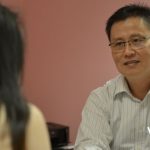Despite having applied for over 50 positions, only a handful of companies responded to Anton (not his real name), and most didn’t follow up for an interview after learning about his medical condition.
Fortunately for Anton, he managed to get career advice from a career coach, Run Qing. Programmes like Workforce Singapore’s Careers Connect, SGUnited Jobs and Skills Centres (SGUJSCs) and the Careers Connect On-the-Go (CCOTG) sometimes pair jobseekers with career coaches like Run Qing, who provide career guidance and advice for their job searches.
Working with Anton
In her interactions with Anton, his career coach observed that while he was self-aware about his employment situation, he could not express himself confidently due to worries about his medical condition.
This likely explained why he was able to secure interviews but faced difficulty in getting job offers.
Anton’s resume was also five pages long and too generic! His career coach used the following framework to explain why Anton’s job search wasn’t going well.
- Situation: Anton’s anxieties began when an employer retracted a job offer. This caused Anton’s confidence to dip, and he began an approach of speaking at length about his medical condition at the start of the interview, which tended to startle his potential employers.
- Self: The longer it took Anton to find a job, the more his anxiety and depression grew. This affected his judgement and attitude towards employers and made him believe he was being discriminated against.
- Support: Anton was single and did not have many close friends. It was important to him that he was not a burden to his family.
Anton was incredibly worried about how others perceived him and was convinced people shunned him because of his medical condition. To help his job hunt, his career coach encouraged him to get a doctor’s letter to explain his condition and certify that he was fit for employment.
He was also encouraged to set up a more professional email address and taught to customise his resume for different job applications.
Role-play sessions were also conducted to practice answering interview questions, especially those about Anton’s medical condition.
Out of the eight job applications he made after working with a career coach, two responded positively and one made an offer!
Anton eventually started work as a Community Support Assistant in a community services organisation.
Some further advice from Lisa Loo, a WSG Senior Career Coach!

Lisa is a seasoned career coach. She has worked almost three decades in multi-national companies in technology, manufacturing and the shipping & logistics industries, and mentored and provided career guidance to over a thousand Singaporean job seekers.
She shares more tips for jobseekers with health or medical conditions.
For jobseekers with health challenges, what are their usual difficulties in finding and securing employment?
Most work-capable jobseekers with chronic medical conditions tend to worry that employers may perceive them differently from those without medical conditions, causing mental stress, lack of self-confidence and the fear of being left out in the workplace. Although more companies are moving towards embracing inclusivity and adopting flexible work policies, the opportunities are perceived to be limited.
To allay such fears, this group of jobseekers will need more support and assurances in the workplace.
What advice do career coaches usually have for them?
- We help jobseekers to be more self-aware of the health impact on all areas of life and work. This includes:
- Exploring how their health condition affects them mentally & emotionally
- A holistic assessment of effects on their lives, such as financial, occupational, physical, family/social integration
- The progression in the jobseeker’s health condition and treatment and how it affects physical activity, communications, energy levels
- Suggestions on how to adapt their work goals and lifestyle to their medical condition
- We suggest jobseekers be realistic in their work choices, and focus on their skills and strengths that are not impeded by their health.
This includes identifying how they can add value to the company employer and demonstrate achievements. They can also use this opportunity to share how their health “impairment” could make them better workers.
The career coach may encourage them to:
- Be open and explore new options/opportunities best suited for the jobseeker’s health conditions identifying clear and sustainable career goals. Goals should remain flexible and & adaptable to changing health conditions.
- Seek friendly employers who are open to hiring this group of jobseekers. Jobseekers can do this through their network or research for companies that are inclusive employers.
- Be open to upskilling and reskilling if necessary.
- Seek mentors/community networks to share experience, knowledge, and support.
- Stay positive, and don’t be ashamed of their illness. Take the time to reflect and learn from your health journey and appreciate how that has shaped them, as it is a testament to the jobseeker’s resilience in overcoming their medical conditions.
Read More: Equipping, Empowering and Assuring Workers – What’s Singapore’s New Strategy?
What are some of the medical conditions jobseekers have had, particularly those who a career coach successfully helped to find a job they want?
The spectrum of medical conditions is very broad. We have aided jobseekers with chronic illnesses such as diabetes, high blood pressure, stroke, hearing impairment, dyslexia, and those who have recovered or are recovering from cancer, anxiety, depression, and more.
So long as they are certified to be fit for work, we will partner with them in their job search and render our career support!
Anton’s story can be found on TRUE NORTH, WSG’s quarterly e-newsletter that aims to help local jobseekers navigate career complexities and find roles that match their beliefs, values and principles.














